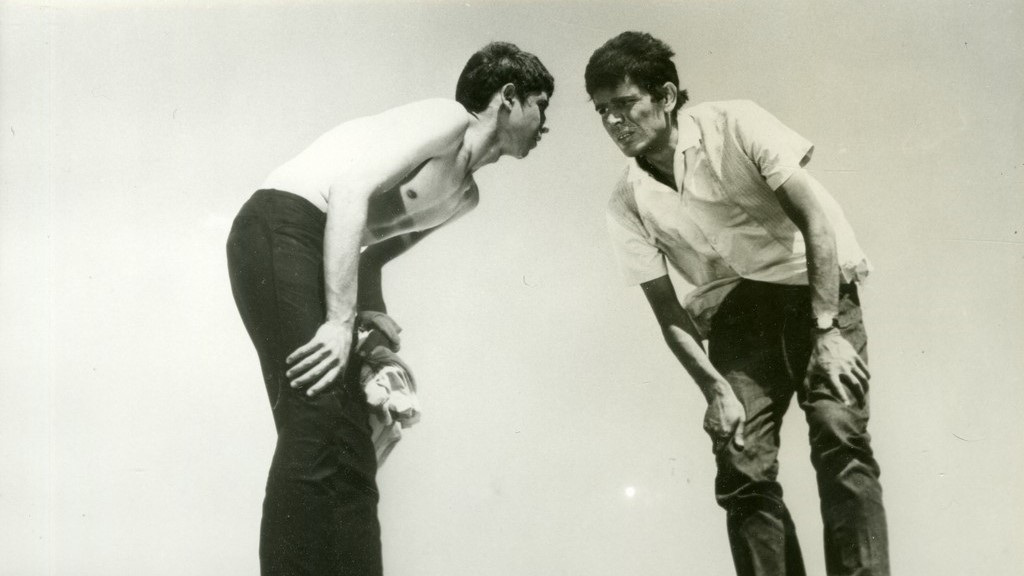“And my father once said, A man without a homeland, will have no grave in the Earth, And he forbade me to leave.”
These are opening words to the Syrian film The Dupes (1972), written across imagery of the vast Levant desert, begging from the questions of dispossession, place, and death.
Directed by Tewfik Saleh in 1972, it was the first Arab feature film to portray the experience of Palestinian refugees through Palestinian protagonists. It was inspired by Ghassan Kanafani’s book Men in the Sun (1963). Kanafani, also was a screenwriter for the movie, contributed greatly to what he termed ‘resistance literature’, including the famous Return to Haifa (1970), before he was assassinated by the Israeli Mossad.
The film follows the stories of three Palestinian men, Marwan, Assad, and Abou Kaiss. They are all refugees in Iraq after the Nakba of 1948, trying to resettle in Kuwait in pursuit of a good job and money to support themselves and their families.
All three men are on a journey, continually, in the film. Abou Kaiss reluctantly left Palestine with his wife and child, in the hope of regaining what he had lost when his land was taken from him. We see that he is still on this pursuit, as he joins the other two men in trying to get to Kuwait for work. Assad is a younger man, who is on the run from the Jordanian police and in search of an independent life, while Marwan is forced to search for work after his older brother and father abandon the family, leaving him to provide for his mother and younger siblings.
Each character is on their own journey, but they share a collective path. The film presents the hope of a ‘promised land’, a ‘heaven’, for which the inhabitants will live in comfort off the land. The characters wander through the arid desert landscape, a clear reference to the Abrahamic story of the Israelites wandering in the desert for forty years before reaching the Promised Land. The sun is ever-present, and the men are always looking up to her, as a keeper of time and as a symbol of hope that the Palestinian right to return will be someday fulfilled.
Uncertainty and anguish over being parted from one’s homeland is explored as Abou Kaiss is haunted by the memories of his past. “I’m not sure if I can make the journey”, he says to his wife in a flashback, before they leave through the desert for Iraq. His uncertainty, and his frequent references to death, reveal the reality of the Palestinian refugee population; many are never able to return in their lifetime.
The Dupes does not shy away from making bold political statements and highlighting the root of the character’s struggle. In a flashback, Abou Kaiss is sitting with his wife and child,talking with an Iraqi driver, who encourages them to leave and secure a better future.
“Do you like it here? Why don’t you go there?”
“What are you waiting here for? Are you still unaware that your house and trees are lost? That you’ve lost your youth and your country”
“What did you expect?…Haven’t you got it yet, that all of this is useless?…Wouldn’t it have been better if you died?”
“Why don’t you move on? Take your things in your hand — what are you waiting for?”
The car driver’s questioning of Abou Kaiss plays in a repeated fashion, becoming increasingly louder and more forceful. It plays over images of the 1948 Nakba and still photographs of negotiations between Arab and Western leaders and the UN, critiquing the backroom politics that played a part in displacing thousands of Palestinians. The multifaceted nature of betrayal is on display; the betrayal of fathers, betrayal by people smugglers, and ultimately, the betrayal of the Palestinian people by Arab leaders.
The characters in the film speak in shaami Arabic, a dialect of the language from the Levantine region, providing a sense of authenticity, as the viewer engages with the characters and storyline through the native language. For Arabic speakers, it offers a more intimate experience, but for those unfamiliar with the language, the subtitles are often difficult to read or are missing at certain points.
Ultimately, the film explores the individual internal conflict faced by many Palestinians following the Nakba, and the yearning for the homeland after forced removal. It is uncomfortable and challenging in that it sentences those who were forced to flee to a life of continual wandering and anguish, but beautifully portrays the reality of many first and second-generation Palestinian refugees’ struggles.
“Perhaps someday you will forgive him…but he might not be able to forgive himself” writes Marwan to his mother about his father leaving his home and family for a better life.
For many Palestinians, there was no choice but to flee, as shown in the film; their homes, trees, and livelihoods were stolen from them. Regardless, the film posits the questions: Can one ever forgive themselves for leaving their homeland?
The Dupes (1972) is playing at the Cinema Reborn Festival which is screening restorations of classic films at the Ritz Randwick. Click here to access the 2024 program running from May 1-7.
Student prices for tickets to the 2024 Cinema Reborn Festival have been set at $15.00.





